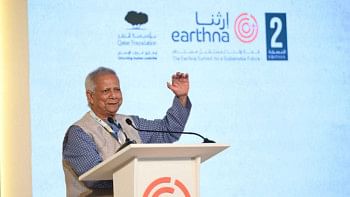Operation Clean Heart to be opened
The government as part of its stance against extrajudicial killings is likely to examine whether the controversial Joint Drive Indemnity Act, 2003 that indemnified all concerned for their acts during the Operation Clean Heart should be scrapped.
Meanwhile, rights activists and eminent jurists who were strong critics of the law still believe it should be repealed to ensure fundamental rights of the people as enshrined in the constitution.
Law, Justice and Parliamentary Affairs Minister Shafique Ahmed told The Daily Star the government would examine the indemnity law if any person aggrieved by the joint operation wishes to get remedy or justice which has been prohibited by the law.
"We would examine whether the indemnity law should be repealed or not," the minister said.
The BNP-Jamaat-led four-party alliance government indemnified all persons for all acts during the Operation Clean Heart, a countrywide joint drive against crime, which began on October 16, 2002 through an order and ended on January 9, 2003.
Around 24,023 army men and 339 navy personnel along with paramilitary BDR, police and Ansar joined the operation aiming to quell countrywide violent crimes.
As many as 44 people died in custody and hundreds sustained injuries following torture during the drive, triggering criticism for violation of human rights.
The then government, however, confirmed only 12 deaths and said all the victims died of heart attack in hospital after being handed over to police.
The joint forces during the drive arrested 11,245 people including some 2,482 listed criminals. The drive also resulted in recovery of 2,028 firearms and 29,754 rounds of ammunition.
In absence of parliament session, the then government first promulgated an indemnity ordinance on January 9, 2003 just prior to the start of pulling out troops involved in the drive.
Later the government passed an indemnity law on February 24 the same year.
Promulgation of the ordinance and later passage of the law were widely criticised by a cross-section of people including eminent lawyers and rights activists.
Many of its critics termed the law unconstitutional and contrary to fundamental rights, though the then law minister Moudud Ahmed tried to justify it saying there is a provision in the constitution to provide indemnity.
"Indemnity is an aborted measure. If there is indemnity to prevent trial of any extrajudicial killing, it should be repealed," advocate Sultana Kamal, former adviser to the caretaker government and rights activist, told The Daily Star.
She added, "There should be trial of every extrajudicial killing; not only those committed in the long past but also those occurred in recent times."
Rights activist and eminent jurist Dr Shahdeen Malik said, "This indemnity law can be challenged in the higher court."
The law minister also said any person aggrieved by the law could go to the High Court challenging constitutionality of this law as it violates fundamental rights of the people or petitioner."
Shahdeen termed the Operation Clean Heart a so-called drive.
He said: "Such an indemnity is contrary to the constitution and all norms of the civilised nations as no-one is above the law in the country. Hence this law should be repealed and perpetrators of crimes during that period whoever they may be should be brought to justice."
"The government may consider the matter if anyone says there was a killing during the Operation Clean Heart but they could not proceed to get justice due to the indemnity law," the minister commented.
During the operation several murder cases were filed with different police stations in the country. But the indemnity law precludes any move to seek justice in the court of law for custodial deaths and human rights violation during the countrywide clampdown on crime.
The Joint Drive Indemnity Act, 2003 says no-one can seek justice and no complaints can be filed against anyone involved in the joint drive for any arrest, death, torture, violation of rights and for any damage of physical, mental or financial nature between October 16 and January 9.
Moreover, no complaints can be lodged against the person or persons who had ordered the drive.
The law says, "It is necessary and pertinent in the interest of the people to indemnify all the persons, including the members of the armed forces and law enforcers, for all the acts done during the joint drive from October 16, 2002 till the workday of January 9, 2003."
This is the second indemnity in the country's history after the infamous ordinance of 1975 that indemnified the people involved in the assassination of Bangabandhu Sheikh Mujibur Rahman, his family members and others on August 15, 1975.
The Khondker Mushtak Ahmed government, which came to power following the bloody coup, issued the 1975 ordinance.
Later, the ordinance was ratified in parliament in 1979 with the Fifth Amendment to the constitution that gave legitimacy to the military rule of Ziaur Rahman.
The Awami League government led by Sheikh Hasina repealed that infamous indemnity ordinance in parliament in 1996.

 For all latest news, follow The Daily Star's Google News channel.
For all latest news, follow The Daily Star's Google News channel. 



Comments